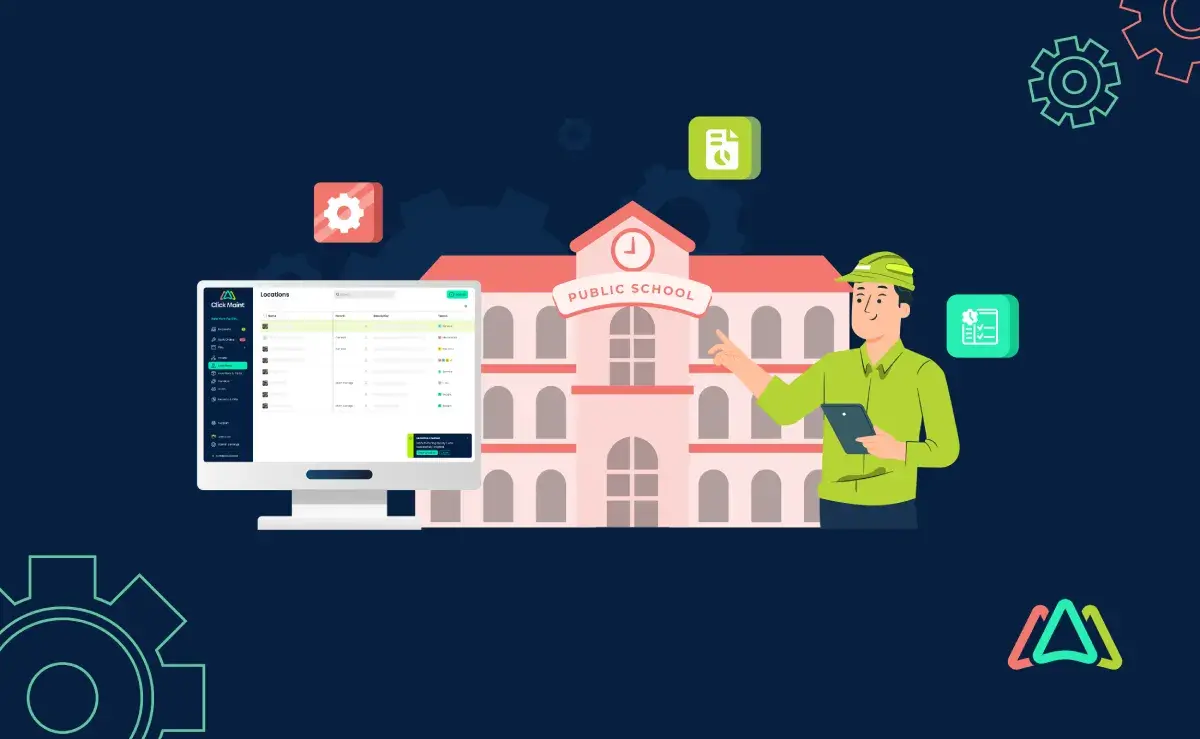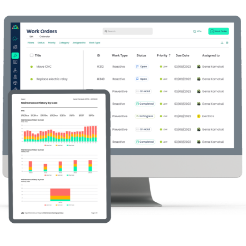
Effective Facility and Grounds Maintenance Solutions for Public Schools with CMMS
Introduction
Did you know that schools with properly maintained facilities see a significant improvement in student performance? This compelling fact underscores the critical role that well-maintained environments play in educational success. Ensuring that school facilities are in top condition is not merely about aesthetics; it is about creating a safe, clean, and conducive learning environment that fosters student well-being and academic achievement. Research has shown that a conducive environment at schools encourages student involvement in academic activities. Conversely, poor maintenance and inefficient management of school facilities negatively affect learning outcomes (Ramli & Mohd Zain, 2019). This demonstrates that effective facility management, including the management of buildings and technical systems, is vital to ensure smooth operation and support for educational activities (Ramli & Mohd Zain, 2019).
Maintaining school facilities can be a daunting task, especially for public schools facing budget constraints and aging infrastructure. This is where CMMS (Computerized Maintenance Management System) software comes into play. CMMS software provides effective solutions for facility and grounds maintenance by streamlining maintenance processes, improving efficiency, and reducing costs. By automating work orders, scheduling preventive maintenance, and managing inventory, CMMS ensures that maintenance tasks are performed promptly and accurately, minimizing disruptions and extending the lifespan of school assets.
This article explores how CMMS software can revolutionize maintenance practices in public schools, ensuring a safe, clean, and conducive learning environment for students. From improving maintenance scheduling to supporting sustainability initiatives, CMMS offers a comprehensive solution that addresses the unique challenges of school facility management. Discover how leveraging this technology can lead to higher standards of hygiene, enhanced operational efficiency, and, ultimately, better educational outcomes for students.
Understanding the Challenges of School Facility Maintenance
Maintaining school facilities presents numerous challenges, particularly for public schools. One of the most significant issues is aging infrastructure. Many school buildings were constructed decades ago and require extensive repairs and upgrades to meet current standards. For example, the average public school building in the U.S. is over 50 years old, with many requiring major renovation. Budget constraints further exacerbate these problems. Public schools often operate with limited financial resources, making it difficult to allocate sufficient funds for ongoing maintenance and necessary upgrades. Resource limitations, including insufficient staffing and outdated maintenance equipment, also hinder the effective upkeep of school facilities.
Specific examples highlight these challenges. A study of California public schools revealed that districts with lower property values and fewer resources spend a higher proportion of their budget on emergency repairs rather than preventive maintenance. This reactive approach is costlier and less efficient, leading to frequent breakdowns and deteriorating conditions.
Poor maintenance directly impacts student health, safety, and learning outcomes. Inadequately maintained facilities can harbor mold, pests, and poor air quality, contributing to respiratory issues and absenteeism among students. A research study found that improved building conditions correlated with better student performance and reduced absenteeism rates. Educational experts emphasize that a clean, safe, and well-maintained environment is a key element for effective learning, as it minimizes distractions and health-related absences, allowing students to focus better on their studies.
Introduction to CMMS Software

A Computerized Maintenance Management System (CMMS) is software designed to streamline maintenance management processes. Core functionalities of CMMS include request and work order management, preventive maintenance scheduling, asset tracking, and inventory tracking. Work order software allows users to create, assign, and monitor maintenance tasks, ensuring timely and organized completion. Preventive maintenance scheduling helps plan regular maintenance activities to prevent equipment failures and extend asset lifespan. Inventory tracking manages maintenance supplies, ensuring necessary materials are available when needed.
CMMS software offers numerous benefits for schools. By automating maintenance tasks, it improves efficiency and reduces downtime, ensuring that facilities are always in optimal condition. Schools can avoid costly emergency repairs through systematic preventive maintenance, leading to significant cost savings. Additionally, CMMS enhances resource management by providing real-time data and analytics, allowing schools to make informed decisions about maintenance activities and resource allocation. Overall, CMMS helps create a safer, more efficient, and cost-effective environment for students and staff.
Key Benefits of CMMS for Public Schools
Improved Maintenance Scheduling
CMMS (Computerized Maintenance Management System) software helps schedule preventive maintenance tasks systematically, reducing unexpected breakdowns. By automating maintenance schedules, CMMS ensures that routine checks and services are performed on time, thereby minimizing the likelihood of equipment failure. This proactive approach helps schools maintain a conducive learning environment and reduces maintenance costs in the long run, thereby enhancing students’ performance.
Streamlining Work Order Management

CMMS streamlines the process of assigning, tracking, and completing maintenance tasks. The software allows facility managers to generate and assign work orders quickly, ensuring that all tasks are tracked from initiation to completion. This reduces manual errors and increases accountability as every step of the maintenance process is documented and can be reviewed.
Better Inventory Management
CMMS tracks cleaning supplies and consumables, ensuring they are adequately stocked. This tracking prevents overstocking and stockouts, which can result in cost savings and uninterrupted maintenance operations. By knowing the exact quantities of supplies on hand, schools can avoid unnecessary purchases and ensure that essential items are always available.
Real-time Monitoring and Reporting

CMMS provides real-time monitoring capabilities, allowing facility managers to oversee maintenance activities remotely. This functionality ensures that any issues can be addressed promptly, reducing the time facilities are out of service and minimizing disruptions to school operations. Comprehensive reporting functionalities offer insights into maintenance activities, resource utilization, and compliance with cleanliness standards. These reports help identify patterns, track performance metrics, and make data-driven decisions to improve maintenance operations. Additionally, real-time data allows for better forecasting and planning, enabling schools to anticipate maintenance needs and allocate resources more efficiently. By leveraging these insights, schools can enhance their maintenance strategies, ensure a safer environment for students and staff, and extend the lifespan of their facilities.
Support for Sustainability Initiatives
CMMS can promote sustainable practices by monitoring the usage of cleaning products and encouraging eco-friendly alternatives. By tracking the consumption of supplies, schools can identify opportunities to reduce waste and switch to more sustainable options. For example, the Boulder Valley School District implemented a CMMS that tracked cleaning product usage and promoted the use of green cleaning solutions, significantly reducing their environmental impact. This not only supports sustainability goals but also creates a healthier environment for students and staff. By integrating CMMS software, public schools can achieve a well-maintained, efficient, and sustainable facility management system that enhances the overall educational experience.
Implementing CMMS in Your School
Implementing CMMS software in your school involves several critical steps. First, schools need to evaluate their specific maintenance needs and select the right CMMS solution that aligns with these requirements. This involves researching different CMMS providers, comparing features, and considering budget constraints. Once a suitable CMMS is selected, the next step is to set up the software, which includes configuring the system to meet the school's maintenance workflows and importing existing maintenance data. Training staff is important for effective implementation; schools should conduct comprehensive CMMS training sessions to ensure that all users are comfortable with the system. Finally, schools should perform a pilot test to identify and address any issues before fully rolling out the software across the institution.
Best Practices
To maximize the benefits of CMMS, schools should follow best practices such as regularly updating data to ensure accuracy and relevance. Continuous staff training is also vital to keep up with software updates and new features. Establishing a routine for periodic reviews of maintenance schedules and inventory levels can help optimize operations. Additionally, setting clear maintenance priorities and goals can help staff focus on critical tasks and measure the system's effectiveness. Encouraging feedback from maintenance personnel can lead to further refinements and improvements, ensuring the CMMS evolves with the school's needs. Lastly, integrating CMMS with other school management systems can enhance overall efficiency and provide a comprehensive approach to facility management.
Potential Challenges and Solutions

During implementation, schools may face challenges such as resistance to change from staff, data migration issues, and initial costs. To overcome resistance, schools should involve staff early in the selection process and emphasize the long-term benefits of CMMS. Data migration can be addressed by ensuring thorough data cleaning and validation before importing into the new system. Regarding costs, schools can start with a basic CMMS package and gradually scale up as they realize cost savings and efficiency gains. Clear communication, ongoing support, and addressing concerns promptly can help mitigate these challenges and ensure a smooth implementation process. By following these steps and best practices, schools can successfully implement CMMS software and reap its numerous benefits, creating a more efficient and well-maintained educational environment.
Conclusion
Finally, using CMMS software for facility and grounds maintenance in public schools offers numerous benefits, including improved maintenance scheduling, enhanced work order management, better inventory tracking, real-time monitoring, and support for sustainability initiatives. These advantages lead to reduced downtime, cost savings, and a safer, more conducive learning environment. School administrators should consider adopting CMMS solutions to enhance their maintenance practices and improve overall efficiency.
Interested readers can explore more about CMMS software by trying out a demo or trial version here. Take the first step towards a well-maintained and efficient school environment today.
TABLE OF CONTENTS
Keep Reading
School facilities are busy, high-traffic places. On average, 45.8 million students attend ...
10 Feb 2026
There is also no shortage of acronyms in the maintenance world. So, here is one more to add ...
6 Feb 2026
You may be wondering: if you are already using CMMS software in your organization, aren’t ...
5 Feb 2026
Although artificial intelligence (AI) has been around since the mid-1950s, it wasn’t until ...
3 Feb 2026
Fire safety is often treated as a compliance checkbox rather than an ongoing operational ...
30 Jan 2026
Schools are regarded as places of learning where children are exposed to the basics of ...
29 Jan 2026
Facility maintenance, much like running a business, defies one-size-fits-all solutions. The ...
27 Jan 2026
When we think of inspections, we usually think about ensuring regulatory compliance and ...
23 Jan 2026
In maintenance operations, having the right spare parts in the right amount and at the right ...
22 Jan 2026
The relentless march of technology continuously reshapes the industry landscape, and with it, ...
20 Jan 2026
New Year’s resolutions tend to focus on lifestyle or financial changes, often aimed at making ...
16 Jan 2026
Now that 2026 has arrived, we’ll see that manufacturing trends will matter more than ever, as ...
15 Jan 2026
Now that 2026 is here, it’s a great time to assess what can be achieved in maintenance ...
13 Jan 2026
2026 is when the role of a CMMS Software in capital allocation comes to the fore. This is the ...
12 Jan 2026
Choosing the right work order software is no longer optional for maintenance teams in 2026. ...
6 Jan 2026
By 2026, CMMS platforms will no longer be the limiting factor in maintenance performance. ...
30 Dec 2025
Spare parts management within maintenance can make the difference between a problem-free ...
16 Dec 2025
Every maintenance team eventually faces the same question: When should we repair, and when ...
12 Dec 2025
Enterprise Asset Management (EAM) software has become a cornerstone for organizations aiming ...
12 Dec 2025
Unexpected equipment breakdowns can disrupt operations, increase repair costs, and reduce ...
11 Dec 2025






